- Home
- Leslie Meier
Christmas Card Murder Page 2
Christmas Card Murder Read online
Page 2
“Uh, no,” answered Lucy, biting into her toast. “North.”
“We’ll definitely have to warm it up then,” Sue said as the wheels started to turn.
* * *
Returning home, Lucy was pleased to notice that Bill had installed a construction Dumpster in the driveway, and when she entered the house, she heard bangs and pounding that indicated demolition was already under way. She gave a yell, letting Bill know she was home and asking if it was safe to come up the stairs, and the banging stopped.
“Come on up,” he invited.
She made her way up the dusty stairs, stepping over stray bits of plaster and chunks of splintered wood, which had spilled into the hall, and gazed through the open door at the work in progress. Bill had packed up the breakables in cartons, and had shoved the furniture in both rooms away from the shared wall and tarped it. He was making steady progress dismantling the wall, which Lucy saw was not constructed with plasterboard, but instead had old-fashioned wood lathing and real plaster. Big chunks of plaster were strewn on the floor, along with piles of ripped lathing strips, and everything was covered with a thick layer of filthy, century-old dust.
“It’s one of the original walls,” she said, taking in the mess and already having second thoughts. “It’s kind of a shame to take down that plaster.”
“It’ll be worth it,” said Bill, leaning on his sledgehammer. “It’ll be a good-sized room, and I’ve already figured out most of the bath.”
“I forgot about demo and how messy it is,” admitted Lucy, glancing at the shrouded furniture, which was covered with bits and pieces of wood and plaster, along with plenty of dust. “Where are we going to sleep?”
Bill shrugged. “Guest room?”
“In twin beds?”
“Sleep sofa downstairs?”
“I guess so.”
Bill picked up the sledgehammer and swung it at the wall, causing Lucy to flinch at the sound of impact. She watched as a large hunk of plaster fell away. Bill bent down to pick it up, then leaned closer, looking into a newly-exposed area behind the baseboard. “Hmm, there’s something here,” he said, reaching into the space.
“Buried treasure?” asked Lucy, smiling. Back when they first moved into the derelict old Maine farmhouse and began the long process of rehabbing it, they had often expressed the hope that they would uncover something valuable that would reward them for their efforts. Nothing had ever turned up, however, except for some old yellowed newspapers used in a feeble attempt at insulation.
“Sorry,” said Bill, producing a bit of red-and-green cardboard. “It’s just an old Christmas card.”
“With a ten-dollar bill inside?” asked Lucy, watching as Bill opened the card.
“Not quite,” said Bill, handing it to her. “Take a look.”
Lucy smiled at the plump image of the vintage Santa with his rosy cheeks, smoking pipe, and plump tummy, then opened the card. The printed sentiment was a standard Merry Christmas and Happy New Year, but the handwritten note beneath it certainly was not. She gasped in shock when she read the neatly-printed message: You lied and I hope you rot in hell.
Chapter Two
Lucy’s jaw dropped as she studied the message, noting that there was no signature, but the sender had scrawled the initials G and B.
“Whoever got this must have known the sender, whoever ‘GB’ was,” said Lucy.
“It seems like ‘GB’ was pretty mad at someone.” Bill was picking up broken bits of plaster and lath. “But why do you think the card was received? Maybe GB lived here and wrote the card in a fit of anger and then decided not to send it and hid it away.”
“Like putting a spell on someone by sticking pins in a voodoo doll?”
“Yeah.”
“I don’t think so.” Lucy studied the card. “The recipient isn’t named for one thing. You’d need some sort of identification for a hex to work. I think this was received by someone who lived here in this very room.”
“And hid the card,” added Bill.
“Yeah.” Lucy stared at the jolly, happy Santa. “I wonder why they didn’t simply rip it up and get rid of it? That’s what I would have done. Do you think it could have fallen there, slipped behind the baseboard?”
Bill shook his head. “No. The baseboard was quite tight against the wall. It would have taken some effort to wiggle it back there.”
“Out of sight, out of mind.” Lucy studied the style of the card. “It’s not real old. Forties or fifties maybe?”
Bill shrugged. “Could be older, I guess. That wall hasn’t been disturbed since the house was built in 1865. We had to rip out the exterior walls to put in insulation and new wiring, but we left the interior partitions in place.”
“Yeah, but the paper’s not fragile, like you’d expect if it were over a hundred years old. It’s actually kind of thick and glossy, and the Santa has a fifties look, like those old Coca-Cola ads.”
“It doesn’t seem right to use jolly old St. Nick to deliver such a nasty message.” Bill was reaching for the sledgehammer, and Lucy figured she’d better get out of the way.
“I think there’s a story behind this,” she said, heading for the door.
“And you’re gonna want to find out all about it,” said Bill, giving a resigned sigh, before taking an especially forceful swing at the wall.
“You know it,” said Lucy, stepping into the hallway. Whoever had received that card didn’t simply want to forget about it, they wanted to hide it. But why? Why the secrecy? Most people would be angry to get such a hateful message, and would have shared their indignation with loved ones, looking for sympathy and support. But this person had hidden the card, perhaps ashamed because the sender was justified. Maybe the recipient had lied about something that caused trouble for the sender. But what? Lucy started down the stairs, wondering what sort of lie could be so terrible that it merited consignment to hell everlasting.
Her thoughts were interrupted by the ring tone of her cell phone, which she’d left on the kitchen table. She hurried down the steep back stairway and grabbed it, discovering the caller was Rachel.
“Hi, Lucy. I’m just wondering if you’re free for lunch tomorrow. Miss T is a bit out of sorts and I think she’d like some company besides me for a change.”
Lucy smiled. She knew that Rachel provided home care for Miss Julia Ward Howe Tilley, the town’s oldest resident. No one except Miss Tilley’s oldest and dearest friends dared to call her by her first name, and they were a sadly-diminished group as age took its relentless toll.
“Sure,” she answered, checking her calendar and noting that apart from a Hat and Mitten Fund meeting, she had a free afternoon. “That would be lovely. Can I bring something?”
“Just yourself. See you at twelve?”
“With bells on,” answered Lucy. She wasn’t just saying that—the warm wool hat she wore during the Christmas season actually did have bells sewn on it and jingled merrily as she walked along.
* * *
The little bell on the door to the Pennysaver office also seemed to jingle merrily when Lucy arrived at the office the next morning. Phyllis, the receptionist, paused in her task of tying Christmas cards to a small fake tree and greeted her with a big smile. Phyllis, as always, was togged out for the holiday in a sweater that was liberally appliqued with reindeer and elves.
“All quiet on the Western front,” said Lucy, noticing that Ted’s desk was vacant.
“Ted’s covering a story. Word just came that Philip Ratcliffe is up for parole and Ted’s interviewing the DA.”
“Already? It seems as if it was only yesterday when he was convicted.” She set her big handbag down on her desk and unzipped her parka, hanging it on the coatrack, as the memories flooded in. Seating herself at her desk and powering up her computer, she remembered the dread she’d felt when she’d learned that Sally Holmes was missing from her lifeguard post at the town beach. As the days wore on and she wasn’t found, anxiety grew as people concluded that a kidnapper was o
n the prowl and began to fear for their own teenage daughters. There had been a huge communal sigh of relief when Philip Ratcliffe was caught and sentenced to life. “Do you think he’ll get out?”
“It’s unlikely,” said Phyllis, snapping the hole puncher that she was using on a Christmas card featuring a bright red cardinal. “It gives me chills to think of what the prosecution said he did to that poor girl,” she added as she threaded a thin red ribbon through the hole and tied the card to a branch with a neat bow.
“Me too,” said Lucy, shuddering and resolving to push the whole sad affair to the back of her mind and get to work. She began by checking her e-mails, discovering only a couple of announcements for upcoming holiday events, including a concert at the high school and a display of antique Christmas cards at the historical society. Lucy decided both deserved previews and made appointments for interviews, then settled down to write up the “Town Hall News” column. It was close to noon when she finished and headed over to Miss Tilley’s.
* * *
The little gray-shingled Cape house was only a few blocks away, so Lucy walked, enjoying the sunny but brisk weather and the charming streetscape of the little coastal Maine town. She loved seeing the old houses, many built by sea captains and dating from the eighteenth and nineteenth centuries, and the occasional peeks at the bay, which was bright blue today. The sidewalk, made of granite slabs, buckled and dipped thanks to tree roots and frost heaves, so she watched her footing as she walked along, occasionally pausing to admire the various holiday decorations. Most of the stately homes were decked with tasteful garlands and wreaths, but a few free spirits indulged in displays of rooftop sleighs with reindeers, set inflatable Santas on their lawns, and draped thousands of colorful, twinkling lights on their trees and bushes.
Miss Tilley went for none of that, of course. A single bough of fragrant balsam pine, with a narrow plaid ribbon tied in a modest bow that hung on the front door, was the sum total of her holiday décor. But the welcome that greeted Lucy when that door was opened was warm and friendly, and a delicious fragrance filled the air.
“Come on in out of the cold,” invited Rachel.
“What are you cooking?” asked Lucy, unzipping her parka. “It smells fabulous.”
“Boeuf Bourguignon, it’s Julia Child’s recipe,” replied Rachel, taking her coat and hanging it up on the hall tree.
“Sit here with me by the fire,” invited Miss Tilley, who was seated in the front room. A toasty fire was blazing away in the fireplace, and Lucy eagerly went to join her old friend. “Now I want to hear all the news, especially the parts that are unfit to print,” continued Miss T, giving Lucy a big smile.
“Lunch will be ready in a few minutes, would you like a small sherry to stimulate your appetite?” asked Rachel.
“I certainly would, and so would Lucy,” asserted Miss Tilley, who was especially fond of a nice amontillado.
“Lovely,” said Lucy, “but make it small. We have that Hat and Mitten Fund meeting later and I can’t be falling asleep.”
Rachel promptly appeared with two glasses on a tray, setting it on the antique cobbler’s bench that served as a coffee table, then returned to the kitchen to finish preparing lunch.
“Cheers,” said Miss Tilley, hoisting her glass and clinking it with Lucy’s. “It’s Christmas, after all.”
“Not for three weeks,” said Lucy, taking a small sip of the golden liquid and finding it delicious and warming.
“It will be here before you know it,” said Miss Tilley, with a sigh. “I’ve got to buckle down and finish up my cards.” She took a sip of wine. “Though I don’t send too many these days.”
“Speaking of Christmas cards, I do have a bit of a story for you. Bill’s been ripping out an upstairs wall so we can enlarge our bedroom and we found an old card tucked behind the baseboard. As a matter of fact, I’ve got it with me.”
Lucy pulled the card out of her bag and passed it to Miss Tilley, curious to see her reaction when she read the message inside.
“Oh, my,” gasped the old woman after she unfolded the card. “That’s not a very pleasant holiday message.”
“What is it?” Rachel inquired from the kitchen.
“It says, ‘You lied and I hope you rot in hell,’ ” quoted Lucy.
“Wow, that’s not the sort of thing you expect on a Christmas card.” Rachel appeared in the doorway, wooden spoon in hand, and peered over Miss Tilley’s shoulder. “Did you say you found it behind the baseboard?”
“I think it was hidden there by a previous occupant of the house,” said Lucy. “Maybe in the fifties, from the look of the card.”
“Who lived there then?” asked Rachel.
“Oh, my goodness, let me think,” said Miss Tilley, fingering the card. “The house was empty for quite a while before you and Bill bought it. I remember thinking it was a shame that nobody was living there. I thought it was a nice house and didn’t deserve to be neglected.”
“That sounds as if there was a bit of an atmosphere associated with the house,” Rachel said as she returned to the kitchen.
“There was, Rachel’s right about that,” said Miss Tilley. “It was a sad sort of place, very stark up there on the hill. Very bare, no trees or flowers. Not unkempt, just unattractive, and then the husband died and the wife went away.” She stared into her empty glass, then set it down on the tray.
“They didn’t have any children?”
“They did, now that you mention it. A daughter. Poor thing, I don’t think she got out much. They were pretty old when she was born, and they were quite religious. No drinking, no cards, no dancing.” She looked up at the ceiling. “I can’t quite remember their name . . . I suppose you could look it up on the deed.”
“No. We bought the house from the bank.”
Miss Tilley took a sip of sherry and closed her eyes. “I can see her, though, in my mind’s eye—the daughter. She’d come into the library and grab a book, then scoot home, hardly saying a word. You would have thought she was doing something sinful, just borrowing a Nancy Drew book.”
Miss Tilley had been the town librarian years ago.
“Didn’t her parents encourage her to read?” mused Lucy, amazed. When Toby was in middle school and had shown little interest in reading, she’d subscribed to Sports Illustrated, leaving the magazines in the bathroom, where she noticed they were definitely read.
“I don’t think they encouraged it,” admitted Miss Tilley. “Or maybe they disapproved of me. I’ve always been a free thinker, and I don’t hesitate to say exactly what I think. I certainly encouraged girls and young women to pursue higher education and careers.”
Lucy smiled and nodded, acknowledging this truth. “Maybe they thought you would influence their daughter to think for herself.”
“Dorcas! That was her name. Dorcas.”
“That’s an unusual name.”
“Biblical. Dorcas made clothing and gave it to poor people,” said Rachel, reappearing. “Lunch is ready.”
Miss Tilley grabbed the arm of the sofa and used it to help her stand, brushing aside Lucy’s attempt to help her. “A lot of churches had Dorcas societies for the ladies, they did good works.”
“I think Rachel did some good work this morning, from the looks of our meal,” said Lucy, holding a chair for Miss Tilley.
A steaming blue-and-white antique Canton china tureen full of Boeuf Bourguignon was placed in the center of the table, accompanied by crescent rolls and a crisp green salad.
“She’s been cooking for days,” said Miss Tilley, “teasing me with delicious fragrances.”
Conversation stalled while they loaded their Canton plates and began eating. Lucy was savoring a delicious mushroom when Miss Tilley suddenly broke the silence. “I remember now. Dorcas came back as an adult when her father died, but she didn’t want to be called Dorcas anymore. She insisted that everybody call her Doris.” Miss Tilley took a bite of her roll. “I guess she thought it was more modern or something.”
“Right. Bill said it must have been hidden there on purpose. The board was quite tight against the plaster.”
“That’s interesting,” she said, chewing thoughtfully. “Who do you think was the recipient? Dorcas or one of her parents?”
“Who do you think?” Lucy asked Miss Tilley. “You knew them all.”
“My vote’s for Dorcas,” said Miss Tilley. “I didn’t know them well, but the parents . . .” Her eyes brightened and her cheeks grew pink with excitement. “The Pritchetts!” she declared, stabbing the air with her pointer finger. “That was their name. The Pritchetts had the reputation of being very no-nonsense folks. They would have wanted to get to the bottom of things, grilled Dorcas unmercifully until she confessed whatever she’d been up to, and probably prayed that the Lord would smite whoever sent it.”
“Reverse revenge,” said Lucy, spearing a cherry tomato.
“I tend to agree,” said Rachel. “It sounds like a fairly classic family dynamic. The parents were deeply committed to a particular set of values that came into conflict with their child’s need for social acceptance and approval. Society was loosening up, women were smoking and drinking . . .”
“And listening to rock and roll, and dancing,” added Lucy.
“Dating,” offered Rachel.
Lucy smiled naughtily. “And that meant necking and making out . . . ”
“Which the Pritchetts certainly would not have allowed,” said Miss Tilley.
“And that’s why Dorcas had to hide the card,” said Lucy. “She couldn’t afford to let her parents see it, or she would have been in big trouble. They would have demanded to know who ‘GB’ was, and what she lied about, and how she was involved with ‘GB.’ ”
“Do you think ‘GB’ was a man?” asked Rachel.
“Might have been a girlfriend, suggested Miss Tilley. “Girls can be very emotional, very mean.”
“They could even have been lesbians,” suggested Rachel.
“But you knew Dorcas? Wouldn’t you have remembered something like that?” Lucy asked Miss Tilley.

 Christmas Card Murder
Christmas Card Murder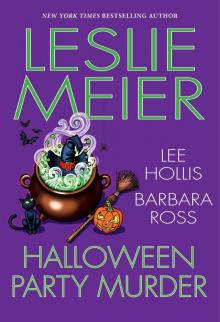 Halloween Party Murder
Halloween Party Murder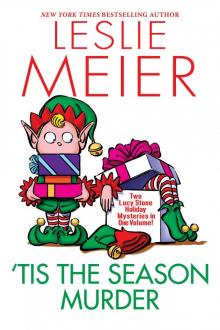 'Tis the Season Murder
'Tis the Season Murder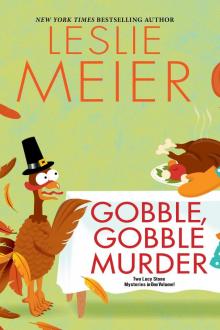 Gobble, Gobble Murder
Gobble, Gobble Murder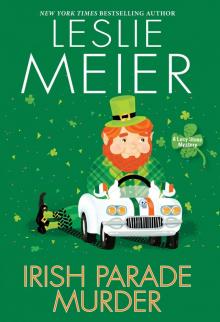 Irish Parade Murder
Irish Parade Murder Bake Sale Murder
Bake Sale Murder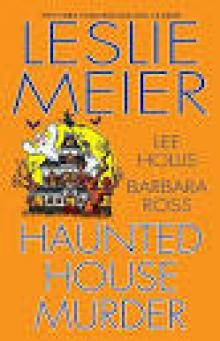 Haunted House Murder
Haunted House Murder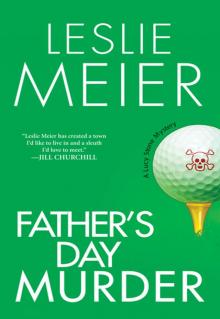 Father’s Day Murder
Father’s Day Murder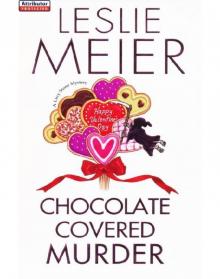 Chocolate Covered Murder
Chocolate Covered Murder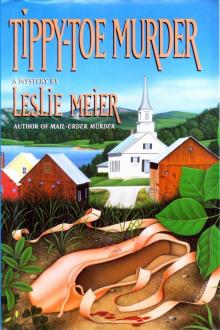 Tippy Toe Murder
Tippy Toe Murder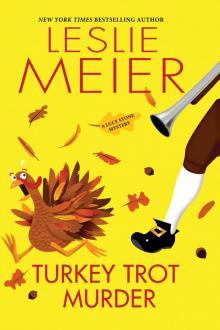 Turkey Trot Murder
Turkey Trot Murder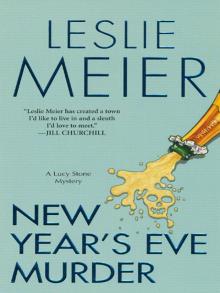 New Year's Eve Murder
New Year's Eve Murder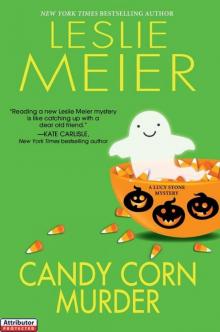 Candy Corn Murder
Candy Corn Murder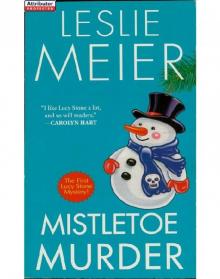 Mistletoe Murder
Mistletoe Murder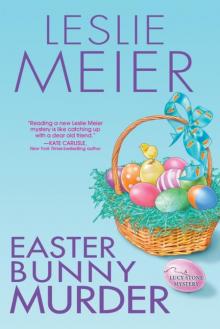 LStone 20 - Easter Bunny Murder
LStone 20 - Easter Bunny Murder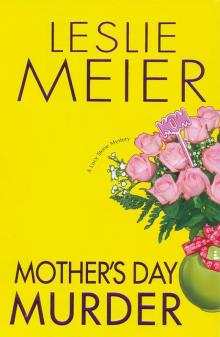 Mother's Day Murder
Mother's Day Murder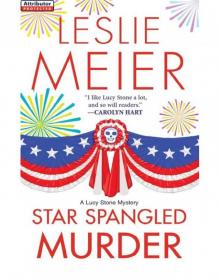 Star Spangled Murder
Star Spangled Murder Silver Anniversary Murder
Silver Anniversary Murder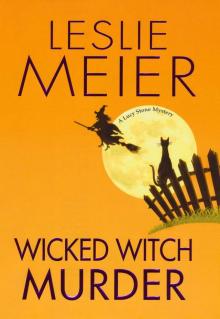 Wicked Witch Murder
Wicked Witch Murder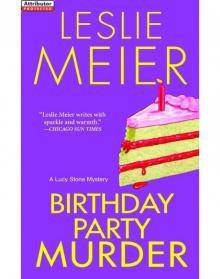 Birthday Party Murder
Birthday Party Murder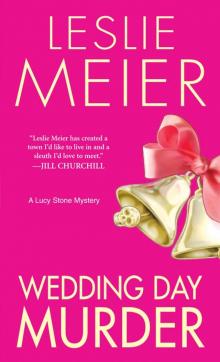 Wedding Day Murder
Wedding Day Murder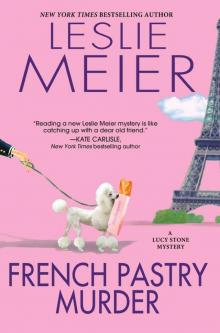 French Pastry Murder
French Pastry Murder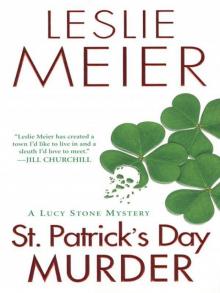 St. Patrick's Day Murder
St. Patrick's Day Murder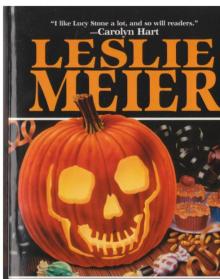 Trick or Treat Murder
Trick or Treat Murder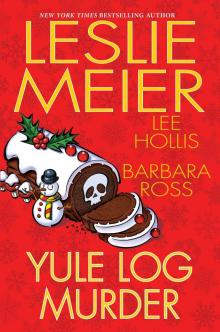 Yule Log Murder
Yule Log Murder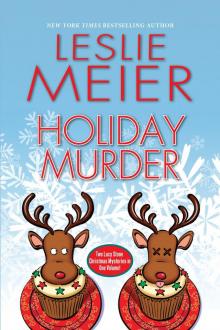 Holiday Murder
Holiday Murder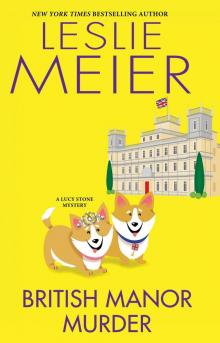 British Manor Murder
British Manor Murder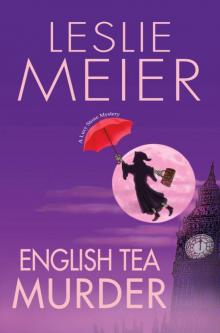 English Tea Murder
English Tea Murder